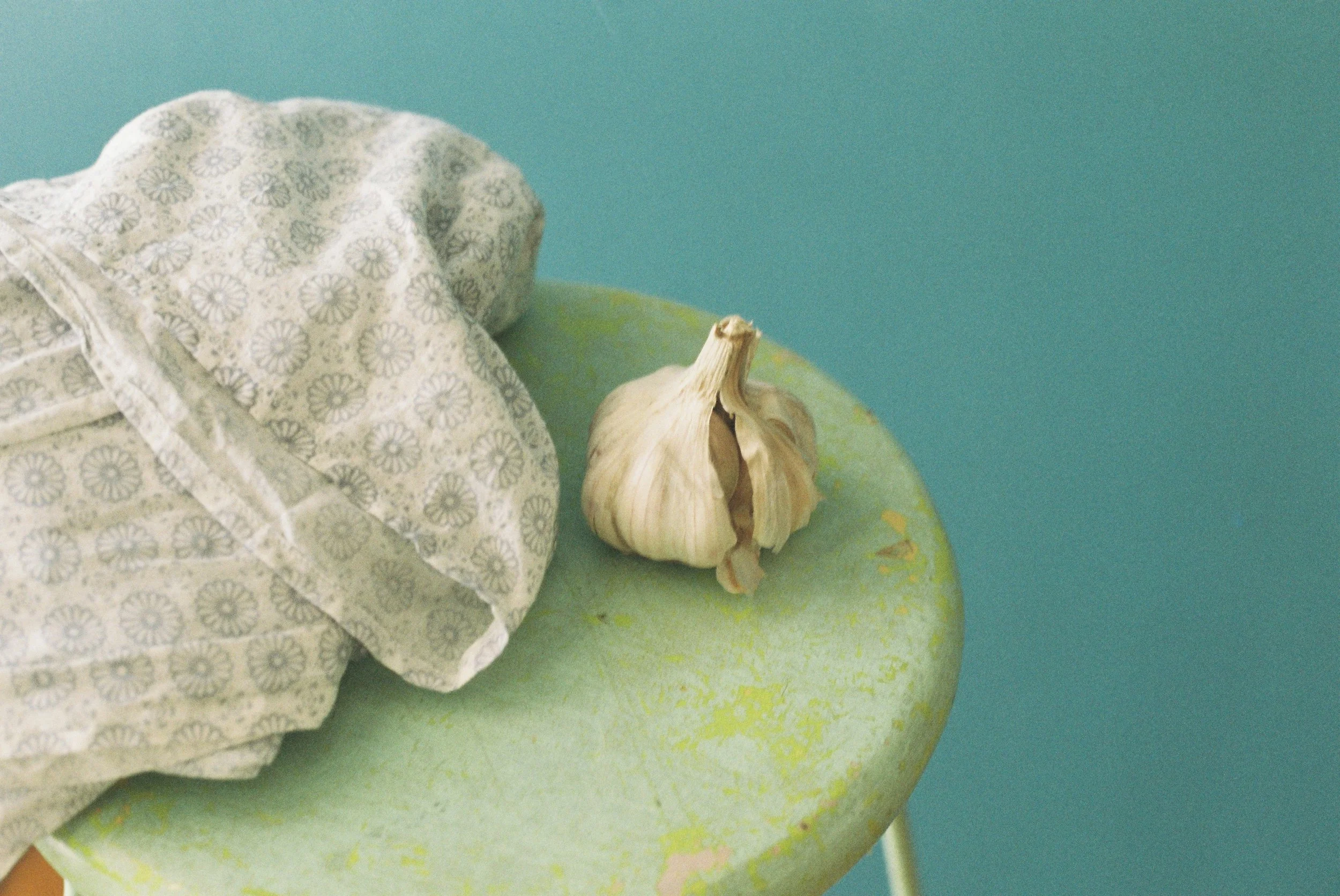Immune Support for the Whole Family
This beautiful image is by Clare Richardson - Titled, Harlemville x
Preventative medicine is key and coming into the cooler months or when something is going around, we can support our immune system to reduce the incidence of getting sick.
Generally Increase the Following:
- GINGER: anti-inflammatory and warming, supporting sweating/the fever process. Make a strong brew of ginger tea by boiling ginger root on the stove for 10 minutes, strain and once cooled, add a teaspoon of raw honey, lemon juice, a teaspoon of apple cider vinegar and an optional shaking of cayenne pepper to build some extra heat!
- GARLIC (especially raw!): is an old-age potent antimicrobial. For the brave, swallow a couple of cloves whole in some Mānuka or raw honey. Otherwise, include lots in your cooking, remembering to chop it and let rest before cooking to release the powerful ‘allicin’ antimicrobial compound.
- ONION: Rich in quercetin, onions are anti-microbial, antiviral and help to break down mucous. Include regularly in your cooking!
- MUSHROOMS: Incorporate mushrooms (shiitake, maitake, reishi) into the diet, adding them to broths/stews for their vitamin D and immune modulating properties. Placing mushrooms “gill-side” up in the sun for 15 minutes before eating can drastically improve their vitamin D levels!
- HERBS LIKE THYME, ROSEMARY, OREGANO & SAGE: These have anti-microbial and anti-inflammatory actions (great to use in a tea or in cooking)
- WELCOME IN WARMTH: Focus on warm, easy to digest foods such as broths, soups and stews
~ Focus on including foods rich in vitamin C (water-soluble so needs to be consumed daily), zinc, iron, vitamin D (“hormone D”- synthesised mainly via sunlight), vitamin A for mucous membrane health (great for dry and itchy nose and eyes)
- FOODS RICH IN VITAMIN C: water-soluble so needs to be consumed daily and not heated! Vitamin C is an antioxidant, anti-inflammatory and supports T-cell production. Foods include: Kiwi fruit, Aussie Kakadu Plum powder, capsicum, kale, broccoli, cauliflower, papaya, citrus fruit, tomatoes, rose hips (powder or as tea) and brussels sprouts.
- ZINC RICH FOODS. Zinc deficiency reduces immune function and zinc is needed for mucosal health and acts as an antioxidant. Foods include: Oysters, eggs, red meat, nuts & seeds (cashews, pumpkin seeds, sunflower seeds), legumes.
SUPPORT YOUR DIGESTIVE HEALTH
- 70% of our immune system lies in the digestive tract and poor digestive function can lead to nutrient deficiencies. Ensure you are limiting refined sugars and alcohol and upping your fibre-rich foods (fruits/veggies, legumes, wholegrains), pre-biotics and probiotics (kimchi, sauerkraut, kefir, yoghurt, miso paste)
STRESS REDUCTION
- Nourish the nervous system... stress heightens cortisol which directly dampens our immune system function. Find ways to cope with stress whether this is a daily meditation or breathwork practice, daily movement like yoga, walking, swimming, Pilates, dancing (whatever movement feels good for you!). Other stress reduction practices may include running an Epsom salt (magnesium) bath (sweat it out!) or foot bath at the end of the day, perhaps reading a book or cooking in the kitchen.
For an Acute Infection:
SLEEP & REST (the most neglected & deepest tool we have)
- Rest: slow down with the exercise, a gentle walk outside in fresh air and sun may be the best thing for you and skip the more intense exercise
- Studies have shown that shorter sleep duration directly increases one’s risk of contracting the common cold.
Adults - Aim to be in bed by 10pm and aim for 8 hours of quality sleep each night.
Children – Aim for approximately 10-13 hours each night (depending on age)
GET OUTSIDE INTO THE SUNSHINE!
- We synthesise Vitamin D in the body from the sun hitting the skin. Low vitamin D levels have been linked to increased susceptibility to infection and lowered immune function. Aim for at least 15 minutes of daily sun exposure around midday with your arms, belly and legs exposed.
INCREASE FLUIDS!
- Hydration is so vital to keep our mucous membranes (mouth, nose, eyes) hydrated.
- Pure coconut water can be a nice addition due to its natural electrolytes.
- Lemon water is brilliant as it contains the vitamin C from the citrus- in summer make lemon juice ice cubes to add to your drinks or if sick, sip on warm lemon water throughout the day.
- Herbal teas count too! Herbal teas that are helpful include echinacea, calendula, thyme, ginger, licorice & rosehips.
Extra Additions:
~ Increase the warm foods, especially broths/stews/soups as they possess easily absorbed nutrients
~ Avoid dairy, bananas and cold foods as these can promote mucous
~ Avoid refined sugars- as we want to minimise inflammation
~ Discontinue iron supplementation as iron is essential for pathogen growth (can “feed” the virus and be used as fuel)
BREATHE EASY
- Use a natural chest rub containing eucalyptus, tea tree, ginger and pine to rub on chest for sniffles and soles of the feet before bed… put socks on for best absorption!
~ Be aware of what herbs are intended for acute infections, for example, Astragalus, a brilliant immune enhancing herb, should not be used during acute infections (stressing the importance of having a consult for individualised naturopathic support).
There are many great herbs for acute infections, chronic immune deficiency, coughs, fevers and respiratory/sinus congestion- please make sure you seek the correct herbs for you and your family!
Handy maintenance Tips TO KEEP THE WHOLE Family WELL
· Preparing some herbal honeys, syrups or oxymels ahead of time and storing them in the cupboard/fridge before Winter, ready to grab out at times of need or have a maintenance dose of 1tsp-1tbsp (dependant on age) per day. Perfect for the whole family *just not under 12 months of age due to honey. Examples: Garlic and thyme infused honey, elderberry syrup
· Ensuring you eat an array of fruits and vegetables and eating seasonally often means you are getting the nutrients the body needs at the time it needs- nature is wonderful like that- it is no coincidence that citrus season falls in Winter, ensuring bountiful vitamin C
· Incorporate mushrooms into the diet, adding them to broths/stews for their vitamin D and immune modulating properties
· Daily sun exposure for the family even in Winter
· Make some broth or vege stock to have on hand in the freezer to make soups quick and easy
· Ensure the family has a good consistent sleep routine and that everyone is well rested. Studies have shown that shorter sleep duration directly increases one’s risk of contracting the common cold.
· Incorporate daily pre-biotic and probiotic rich foods each day to ensure your digestive health is optimal! Think enzyme-rich yoghurts, kefir, ferments like sauerkraut, kimchi, picked vegetables, miso and tempeh and microbiome supporting foods like leeks, artichokes, garlic and onion
· Utilise common garden herbs such as thyme, sage, peppermint and rosemary as these are often possess anti-microbial and anti-inflammatory actions (great to use in infused honey or as tea)
As always, this is a guide. Please seek individualised guidance by speaking to your health practitioner or booking a consultation for individualised and tailored advice, regarding specific herbs or supplements x
Annabel Murray, In A Day Naturopathy


